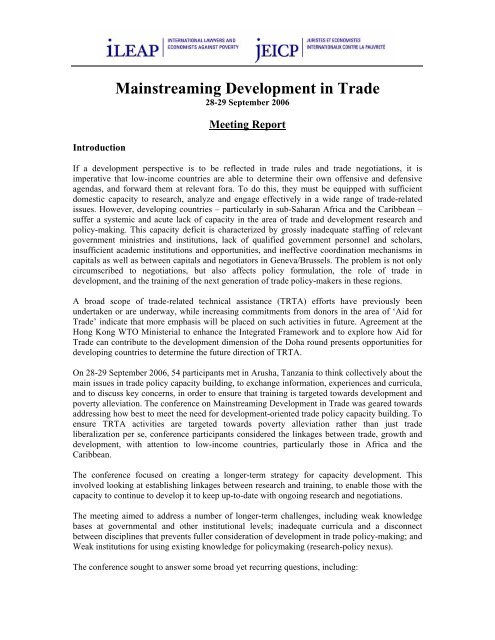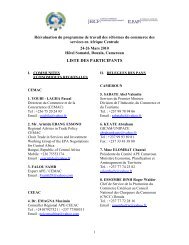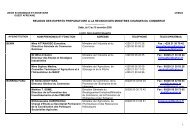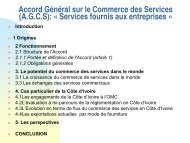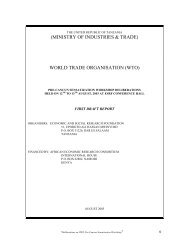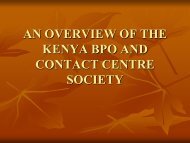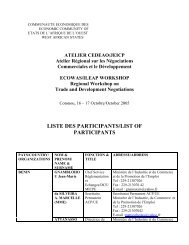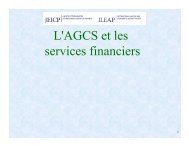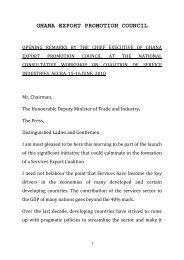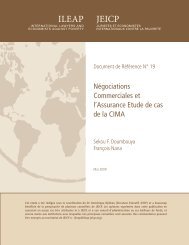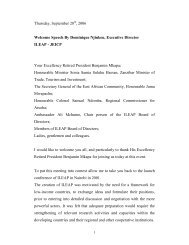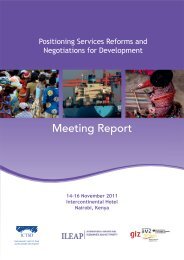Report of Proceedings - ILEAP
Report of Proceedings - ILEAP
Report of Proceedings - ILEAP
Create successful ePaper yourself
Turn your PDF publications into a flip-book with our unique Google optimized e-Paper software.
1.3 Inadequate structures, processes and incentives around trade policy formulationremain a central hurdle to linking trade with development.In many African and Caribbean countries, the effectiveness <strong>of</strong> trade ministries is <strong>of</strong>ten hamperedby insufficient numbers <strong>of</strong> posts and <strong>of</strong> skilled pr<strong>of</strong>essionals. There is <strong>of</strong>ten a lack <strong>of</strong> focus on astrategic approach to trade policy formulation that takes advantage <strong>of</strong> both expertise in otherdepartments and <strong>of</strong> existing networks <strong>of</strong> academics, policymakers, NGOs, IGOs, and SMEs. Thelink between the national and the regional approach is also <strong>of</strong>ten lacking. A fundamental elementbehind this is political will, without which analytical inputs will make much less <strong>of</strong> a difference.Factors such as poor pay and lack <strong>of</strong> freedom <strong>of</strong> expression in the trade ministries reduce theincentives for strategic and development-oriented trade policy making.Proposals for way forwardShould reform <strong>of</strong> the trade policy-making structure be necessary, a bottom-up process, withsupport from other areas <strong>of</strong> government, is likely to be more successful than a top-down one.Trade ministries could use home-grown reform programs developed with wide stakeholderconsultation, in order to foster national ownership and to develop realistic time frames. To assistthis, donors support should be flexible, and donors should agree to support mainstreamingdevelopment in trade in projects led by the governments.As policy is manoeuvred through the national political economy environment, it is important toconsult the informal layers <strong>of</strong> power when designing a coherent trade policy that can supportbroad-based development and poverty reduction. A wide consultation, using existing consultationmechanisms, e.g. in the PRSP process, could be used. Research institutions can be helpful bypointing out gaps and outlining common ground between different interest groups.To deal more effectively with their well-staffed counterparts in OECD countries, trade <strong>of</strong>ficialscould engage experts to assist them during negotiations to provide ‘on-the-spot’ advice. Sincethere is a serious shortage <strong>of</strong> good ACP-based trade experts, particularly in specialized areas suchas competition policy and intellectual property, more effort needs to be made to train such a cadrein the regions.1.4 Develop and maintain a solid regulatory framework on trade and investment.A stable and well-designed regulatory framework – which includes a comprehensive and strategictrade policy – enables governments to preserve their policy space, while at the same timeattracting investment. It sets the scene for countries to develop proactive and <strong>of</strong>fensive positionsin trade negotiations and to reap the benefits from these. Good regulatory frameworks shouldallow developing countries to lay down conditions for investors that foster sustainabledevelopment.Proposals for way forwardThere is a need for developing countries to formulate and implement frameworks on trade policyand investment that prioritize enhancement <strong>of</strong> productive capacities and diversify their exportbase. Policy makers need to be equipped with knowledge and requisite skills and resources toenable them to design, lead and implement policies which mainstream trade in the nationaldevelopment strategy (and vice versa). Where these are lacking, local researchers could help tobolster trade capacities.4
2 Research-policy linkage2.1 Improve communication and interaction between researchers and policy makers.The challenge for those trade analysts concerned with development and anti-poverty objectives isto insert their analytical perspectives into ongoing trade policy discussions and negotiations sothat they are a normal and expected part <strong>of</strong> the policy discourse.Due to a lack <strong>of</strong> interaction and communication between policy makers and national / regionalresearchers and experts, policy makers <strong>of</strong>ten turn instead to international organizations andresearch institutes or to their own diplomatic missions to obtain information and analysis. Localuniversities may have the capacity but are <strong>of</strong>ten overlooked in the policy making / negotiatingprocess, as they are considered too far removed from the negotiating reality.Proposals for way forwardGovernments tend to require advice and analysis in a short timeframe on trade issues, particularlyduring negotiations (<strong>of</strong>ten within 24-48 hours). Academic researchers, who tend to work onlonger timeframes than government <strong>of</strong>ficials, will likely have to adapt the way they undertakeresearch if they wish to support this process.Communication flow can be improved in both directions:- Policy makers could inform researchers <strong>of</strong> major policy questions, and involveresearchers in policy consultations, e.g. by including them in <strong>of</strong>ficial governmentdelegations and policy reviews. Governments could assist this by providing easy accessto data and information by researchers, e.g. by creating a trade data desk withinministries.- Researchers could invite policy makers to assist in designing research and trainingprogrammes. This can help align research programmes with national priorities, and helpprepare graduates for potentially joining ministries with an appropriate knowledge basefor their country / region. To enable absorption <strong>of</strong> research findings by policy makers,these could be ‘re-packaged’ in simple and precise language, for instance as policy briefsor case studies custom-tailored to policy makers’ needs. A suggestion was made to makeuse <strong>of</strong> journalists to help communicate issues to policy makers.Academics can play an important role in (i) conducting specific research and background studies;(ii) providing an open space to foster dialogue, where all ideas are equally subject to testing; and(iii) skill enhancement, including short sabbaticals and visiting scholarships for government<strong>of</strong>ficials. A ‘revolving door’ approach <strong>of</strong> academia – government – private sector –governmentcould be useful to help bring in different perspectives.Negotiating positions should ideally be based on significant evidence-based studies, involvinglocal experts with assistance from international researchers.3 Design and delivery <strong>of</strong> capacity building programmes3.1 Long term and short-term training achieve different but complementary objectives.In the long run, trade-related technical assistance (TRTA) needs to build long-term humantechnical capacity; build institutional capacity; ensure local ownership; and create a framework5
for laws and legal regulations. This must be reinforced by building capacity in the public servicesuch that ministers have competent staff that understand the technical details <strong>of</strong> trade policy. Tobuild this capacity, long-term training programmes in areas such as economics and law can becomplemented with short-term courses, conferences and seminars.While training in both law and economics remains essential, there is a need to <strong>of</strong>fer lawyers andeconomists multidisciplinary training, including in policy and negotiation. This can be furtherdeveloped by acquisition <strong>of</strong> technical skills such as data analysis provided by institutions such asUNCTAD and the WTO. In addition, a recurring demand <strong>of</strong> low-income country <strong>of</strong>ficials in tradepolicy capacity building is assistance to travel to negotiations, where their staff can acquireimportant on-the-job training that can <strong>of</strong>ten be more important than training workshops.Workshops tend to be given on a sporadic basis with little follow-up or consistency on substance.This has led to a field with many generalists and not enough specialists, with the result thatgeneralist negotiators from small countries <strong>of</strong>ten find themselves negotiating with teams <strong>of</strong>highly-trained specialists from developed countries.Identified constraints in this area include: (i) difficulty <strong>of</strong> instituting multidisciplinary programs;(ii) infrastructure constraints – e.g. libraries, access to data and data sources, or even teachers; and(iii) quality <strong>of</strong> trainers- some trainers are not at an adequate level, and end up giving studentsincorrect information even when the curriculum is good.Proposals for way forwardA number <strong>of</strong> solutions to improving the effectiveness <strong>of</strong> TRTA were raised in the meeting. Theseincluded: (i) the use <strong>of</strong> tests, exams, and evaluation mechanisms to ensure retention <strong>of</strong> subjectmatter; (ii) using e-learning exercises before going to a face-to-face to ensure comprehension <strong>of</strong>background materials; (iii) partnering with international agencies to help with access to data andteachers; (iv) for short to medium-term training, programs should be run in-country; (v)attendance and entry requirements or prerequisites for short-term courses; and (vi) build capacityto enable countries to articulate their TRTA needs such that delivery can be better targeted.Institutions such as TRALAC are using various techniques to forward a development-orientedperspective. For instance, TRALAC <strong>of</strong>fers a programme combining law, economics andmanagement, which serves to develop inter-disciplinary expertise and allow trainees to use thisexpertise more effectively in trade policy making. It also <strong>of</strong>fers ‘Mixed Modality Learning’ thatincludes residential learning programmes, distance/e-learning, and anchoring <strong>of</strong> programs ininstitutional settings, which enhances buy-in from ministries/governments, since participantsremain in their work environments. In addition, assignments are made consonant with the workresponsibility <strong>of</strong> participants.3.2 WTO regional training provides example <strong>of</strong> challenges and areas for improvingdelivery.In delivery <strong>of</strong> regional training programs by the WTO, there is an ongoing challenge <strong>of</strong> ensuringthat the right people are targeted such that the training received can be maximized at the policymaking level. Since it remains up to governments to appoint trainees, there is no guarantee thatthe attendees to these courses are necessarily the right people, or even that their newly-acquiredskills will be made use <strong>of</strong> by their ministries upon completion <strong>of</strong> the training.6
Participants in regional exercises have expressed a need for more specialized training. Theyacquire a general understanding <strong>of</strong> trade rules through the courses, but there is a gap betweenwhat they get and how they can make it useful and practical at the government level. They havefurther expressed concerns about what implementation <strong>of</strong> WTO Agreements would mean for theircountries.Proposals for way forwardWhile the WTO cannot force governments to send particular individuals to its regional trainingsessions, it can suggest ideal pr<strong>of</strong>iles <strong>of</strong> trainees (i.e. those working on trade-related issues,graduate if possible, and importantly that the person will continue to work on trade related issuesonce he/she returns to capital).Collaboration with regional trainers in short-term courses such as those <strong>of</strong>fered by the WTO isessential in order to make the information more specific to recipients. Often regional trainers canalso provide information that might be too politically sensitive for WTO trainers to include.In future, the aim will be to provide short, modular, more specialized training to formerparticipants <strong>of</strong> regional trade policy courses on a small number <strong>of</strong> topics identified via needsanalysis. Specialized courses have already been <strong>of</strong>fered in Trade Negotiations Techniques,Dispute Settlement, SPS and Services, with the first three courses simulation-based.3.3 Need for more training in economic analysis, and more regional data.A number <strong>of</strong> participants pointed out that there is a lack <strong>of</strong> solid economics training in tradepolicy capacity building courses currently on <strong>of</strong>fer. Many courses focus too heavily on teachingtrade rules. However, for development, it’s more important to focus on identifying economicconditions in specific countries / regions and exploring how to use WTO rules to supportdevelopment. This supposes an ‘economics-first’ focus to understand basic economic principlesand what the trade rules mean from an economics perspective.There continues to be an absence or inadequacy <strong>of</strong> quantitative data in the regions, and the datathat is available is <strong>of</strong>ten <strong>of</strong> poor quality. Such statistics are important to shore up arguments andpositions at the negotiating level.Proposals for way forwardCountries and research institutions could conduct more ‘case-study’ based research involvingeconomic analyses <strong>of</strong> sectors, and outlining the costs and challenges <strong>of</strong> implementing particularagreements for specific countries and regions. Some research institutions, including the GraduateInstitute <strong>of</strong> West Indies, have been using case studies, negotiation simulation, etc. in theircurriculum. These allow for a focus on trade issues at the national level, which can help informand prepare negotiators. In addition, participants to these programmes have come from the privatesector, the public sector, and NGOs, which helps to build networks and bring in broaderperspectives into the training.A tranche <strong>of</strong> aid for trade funding could be allocated to data collection; this might be most usefulif conducted on a regional basis, with linkages to research institutes in the regions.7
3.4 Involvement <strong>of</strong> other groups beyond researchers and government key for movingtowards a development perspective.The private sector and farmers are <strong>of</strong>ten left out from transmission <strong>of</strong> key information throughtraining. It is important that every country finds a way <strong>of</strong> involving all sectors involved in trade,with the government taking a facilitation role.Proposals for way forwardJournalists could be included in trainings as they have an important role to play in communicatingthe issues to a wider audience.Regional training partners can talk to the private sector and educate them on trade negotiationsand WTO issues that affect them, e.g. SPS, TBT etc.NGOs have been very useful in bringing a development dimension to trade policy. They tend tomake use <strong>of</strong> existing research and act as vectors to bring this forward to policy-makers.3.5 Skewed incentives can disrupt capacity building activities.There is an ongoing problem with incentives <strong>of</strong>fered to those participating in trade policycapacity building activities. These are caused chiefly by generous per diems or sitting fees fromIGOs and donors, which can skew both the ‘market’ <strong>of</strong> delivery <strong>of</strong> technical assistance as well asexpectations from trainees. Most research institutes, for instance, do not have the funds to <strong>of</strong>ferlarge per diems or sitting fees to compete with workshops <strong>of</strong>fered by other actors.Proposals for way forwardScholarships should cover all direct costs, but people should not be paid to take courses. Capacitybuilding needs to be seen as an investment in people, rather than income support.Different capacity building delivery institutions should attempt to harmonize the incentives<strong>of</strong>fered to trainees.Encourage countries to demonstrate interest in sending <strong>of</strong>ficials for training by paying for airfaresor other fees for their participants. This helps to establish buy-in into the training and increasesthe chances that trainees’ new skills will be called upon by their ministries.4 Research NetworkA number <strong>of</strong> participants felt that a network <strong>of</strong> people involved in multidisciplinary training intrade (i.e. an epistemic community <strong>of</strong> trade researchers) should be formulated that would includeregional hubs. Such a network would consist chiefly <strong>of</strong> African and Caribbean experts who couldfulfill specific trade-related requests from governments. <strong>ILEAP</strong> could be a catalyst for formingthe network, which could be sub-divided into different open-ended groups based on areas <strong>of</strong>research expertise. It would be useful to assess progress on this once every 2-3 years. To be fullyeffective, such a network should move beyond discussion <strong>of</strong> delivery mechanisms formainstreaming development into trade policy, and maintain a strong focus on policy content andmeans.8
The network could build on the model <strong>of</strong> the AERC, wherein capacity is improved withinparticipating institutions to address trade and development issues. Universities in the regionscould play a key role by gathering data in areas such as trade facilitation, services, standards, etc.and making it available to all who want it.The network would further help researchers and governments keep updated on what capacitybuilding is being done and by whom.9


